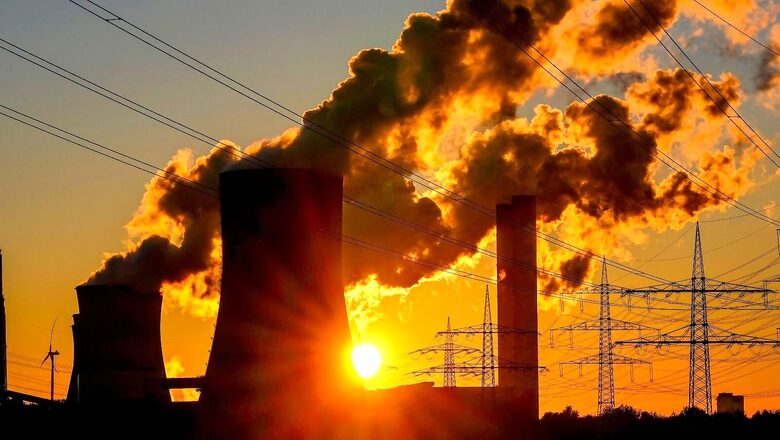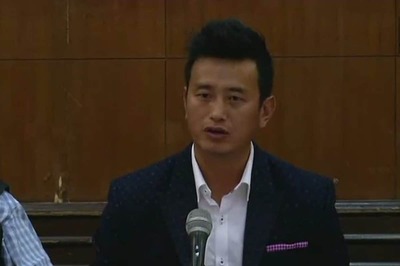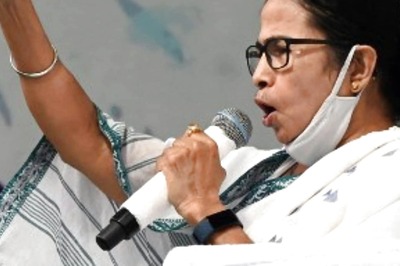
views
India has decided that developed nations that have already enjoyed the fruits of low-cost energy must aim to achieve net zero much faster in order to help the developing countries pursue their development goals, said Union Minister Piyush Goyal ahead of the 2021 United Nations Climate Change Conference or COP26 to be held in Glasgow, Scotland, on Monday.
‘Net zero’ emissions means a situation where the amount of greenhouse gasses produced is the same as the amount that is removed from the atmosphere, by employing strategies like the planting of trees and deploying advanced technologies to capture carbon dioxide.
“Developed countries, which have already enjoyed the fruits of low-cost energy for several years, will have to go for net zero much faster… so that they can release policy space and some carbon space for the developing countries to pursue their development agenda,” said Goyal at a press conference on the sidelines of the G20 Summit in Rome.
“We still have to work on technological solutions… There are no available adequate technologies to be able to observe large amounts of clean energy into the grids and maintain grid stability. Therefore, we will have to look at more technology and innovation playing an important role before we can identify a year (to achieve net zero),” he added.
India’s Sherpa at the G20 further said the leaders really got into the text the language that confirms that the developed world has acknowledged that they have not done enough in terms of meeting their commitments. “Developed nations will have to be more forthcoming in providing finance in providing technology and (be) the enablers to make the transition to a clean energy world in the future,” he added.
The Glasgow meet has been described as the “last best chance to get runaway climate change under control” after reports showed that the world is nowhere close to keeping global temperature rise to 1.5 degrees by the end of this century.
Before Goyal’s presser, president of the COP26 climate summit Alok Sharma called on countries to work together to avert the most devastating impacts of global warming. The Glasgow gathering will be the “last, best hope to keep 1.5C in reach”, said Sharma, referring to the temperature aspiration of the landmark Paris deal.
Meanwhile, G-20 leaders have agreed that the WHO would be strengthened to fast-track the process for emergency use authorisation for Covid-19 vaccines, Goyal said.
Goyal said the Leaders adopted the ‘Rome Declaration’ at the G20 Summit and the communique gives a very strong message under the health section with the countries agreeing that the COVID-19 immunisation is a global public good. Noting that energy and climate were the centre of the discussions at the G-20, Goyal said India and many other developing countries pushed for safeguarding the interest of the developing world.
“We were also joined by the developed countries to increase the ambition from the current levels of commitment and active interest that the developed world has shown in terms of providing technology and affordable finance,” he said.
Goyal said it was also decided that the recognition of Covid vaccines which are deemed to be safe and efficacious by the World Health Organisation (WHO) will be mutually accepted subject to national and privacy laws that the countries may have.
“But more importantly it has been agreed that everybody will help to optimize the processes and procedures of the WHO for vaccine approval and emergency use authorisation, and the WHO will be strengthened so that it can do the recognition of vaccines faster,” he said. Prime Minister Modi had told G20 leaders on Saturday that India is ready to produce over 5 billion Covid vaccine doses by the end of next year to help the world in the fight against the pandemic. He had asserted that it was necessary that the WHO approves Indian vaccines at the earliest.
A technical advisory group of the UN health agency will meet on November 3 to conduct a final “risk-benefit assessment” for Emergency Use Listing of Covaxin. Bharat Biotech’s Covaxin and AstraZeneca and Oxford University’s Covishield are the two widely used vaccines in India. Stressing the need to bring back economic activity on tourism, Goyal said “we all have agreed to work towards a common framework for accepting each other’s vaccine certificates.”
Prime Minister Modi’s mantra of sustainable lifestyles was reflected in the G-20 declaration on sustainable consumption and responsible production patterns, he said. Livelihoods of small, marginal farmers were among focus areas of India’s discussions at the G-20 Summit in Rome, Goyal said.
The G20 countries also have agreed to extend the debt service suspension initiative so that low income countries are not burdened with debt repayment at this critical time, the Union minister said. “We discussed gender based violence and increasing women participation in the workforce. We also denounced uneven distribution of unpaid care and domestic work,” he said. Leaders of the G20 are now looking forward to India taking the G20 presidency in 2023, Goyal said. “We will continue to represent the voice of the developing world and protect the interests of humanity,” he said.
The G20 is a leading global forum that brings together the world’s major economies. Its members account for more than 80 per cent of the global GDP, 75 per cent of global trade and 60 per cent of the population of the planet.
With PTI inputs.
Read all the Latest News , Breaking News and IPL 2022 Live Updates here.



















Comments
0 comment